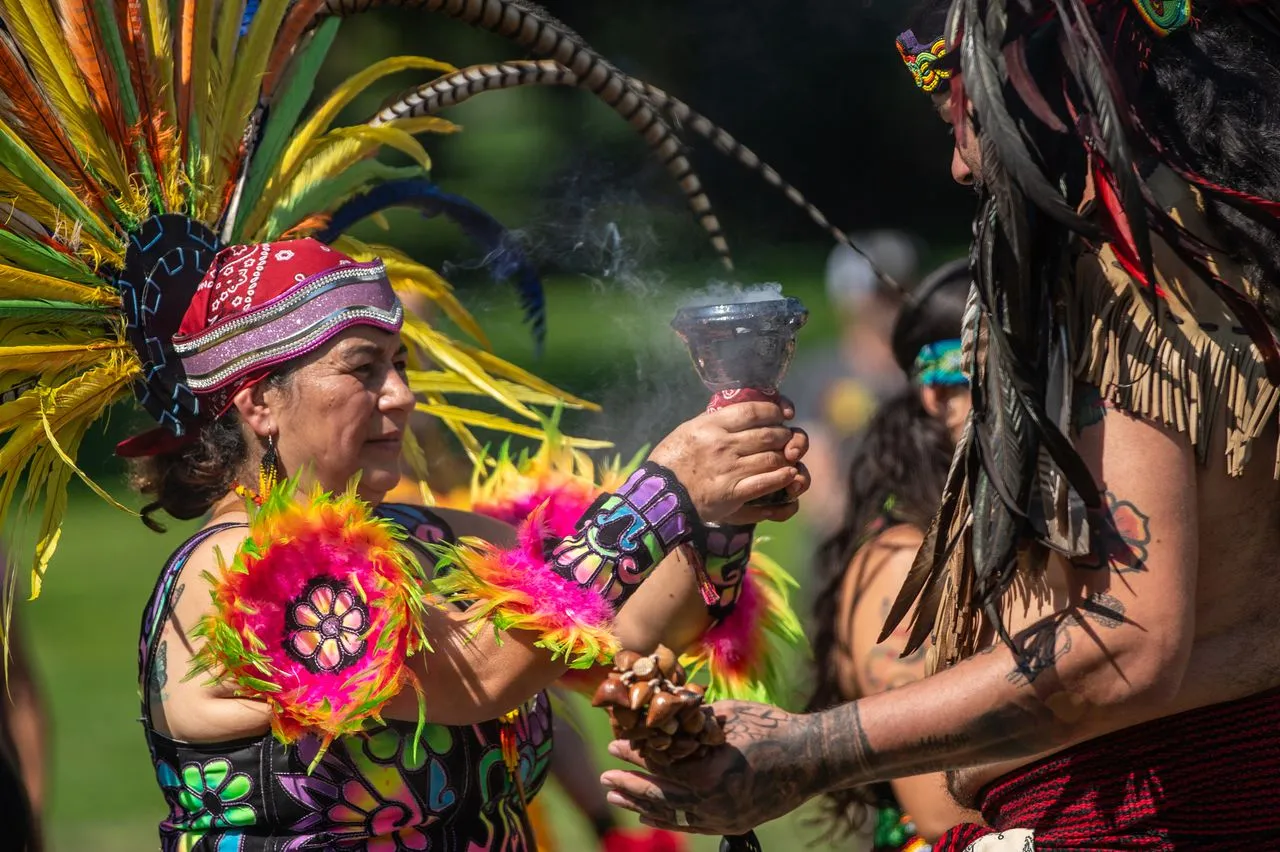When former chairman of the Portland chapter of the American Indian Movement Art McConville died in February 2022, it was unclear who would carry on the tradition he started at Cathedral Park. For a moment, it felt like the blessing of the Willamette’s water may have died with him.
But one of his final requests was to pass along the responsibility to his niece, Farrell Lucei-Bryant. On Saturday, Lucei-Bryant, a member of the Confederated Tribes of Warm Springs, brought blessings and prayers back to the Willamette’s shores for the first time since the COVID-19 pandemic.
“I was pretty shocked,” Lucei-Bryant said. “I’m doing my best to follow through, and making sure that I’m honoring his legacy. I’m going to go forward with it the best way I know how, with an open heart and open mind.”
The event is put on by the Portland Harbor Community Coalition, a nonprofit organization advocating for the restoration of the Willamette River. It featured ceremonial singing, drumming, dancing and prayer from Native American, Mayan, Mexica-Azteca and Purépecha — indigenous people in the northwestern region of Michoacan, Mexico — cultural groups.
Lucei-Bryant said the turnout was surprising, and that it was inspiring to see so many people gathering for the same cause. Dozens came by throughout the day.
Full Article
“It’s heartwarming,” Lucei-Bryant said. “The amount of people who are willing to give their time to heal the water with prayer, song and dance. It’s good to see that people have the same belief and understanding that water is important — without water, we have nothing.”
The ceremony aims to help heal the water, long polluted by industrialization in Portland, and the wildlife that lives in it. The event received some funding from the city of Portland through grants, according to Cassie Cohen, executive director of the Portland Harbor Community Coalition.
Cohen said the organization has been bringing together Indigenous communities and people of color impacted by water pollution and the lasting damage it causes for ten years. McConville was a close friend to Cohen, she said, and hosting this gathering was an important step in honoring him.
“We had planted a seed with Ferrell and her family, and we talked about Art’s wishes,” Cohen said. “We followed up, and said it was time to explore this. It was kind of a last minute plan, but it really came together.”
In Indigenous and Native American cultures, water holds great significance and represents life and good health. The degrading water quality in the Willamette and around the world is something these groups are advocating to change.
Malin Jimenez, an Indigenous Maya from Guatemala and a community representative for the harbor coalition, emphasized the need to bring attention to the climate crisis.
“We pray for the water to be healed, for our environment to improve, and we pray as individuals to heal as well,” Jimenez said. “Where I’m from, water is life.”
Throughout the day, each cultural group performed a ceremonial dance to bless the Willamette, hoping to set a good example for future generations. By midday, the rattle of Aztec anklets rang across the park along with the steady beat of drums. Afterwards, Purépecha dancers formed a line wielding large fish nets to perform the “Dance of the Whitefish”
Lucei-Bryant’s son, James Hance-Lucei, sang and played drums with his eight-year-old brother. Hance-Lucei, 23, recently started learning how to play and sing his tribes’ songs. It’s been an honor to dive deeper into his culture, he said.
“To be here in support of my mom, my immediate family and my ancestors and my grandfather Art to honor the water and share our prayers and make a difference is important,” Hance-Lucei said. “Having an upbringing being Indigenous, we hold on to our culture and way of life through resilience.”
Hance-Lucei felt the pressure of honoring McConville’s legacy along with his mother, but said that once he arrived he felt a strong sense of belonging.
“When my mom was telling me about it, I knew she was nervous, and we never expected to be given this kind of leadership role,” he said. “We both had the jitters, but as soon as we got here that all went away because everyone has such strong spirits here.”
Hance-Lucei echoed the sentiments of his family members and cultural groups advocating for improved water health, and said that the future of the next generations rests on the shoulders of people today.
“>To quote Michael Jackson, ‘If you want to make the world a better place, take a look at yourself and make a change,’” he said. “You can’t expect the water to change itself. We all have to take a look at ourselves and see what we can do.”
Power to first nations people, relatives and friends.



